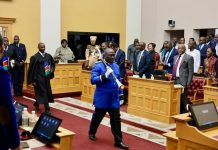Africa-Press – Namibia. IN SEPTEMBER 2021, THE United States Securities and Exchange Commission (SEC) handed an anonymous whistleblower US$110 million. It was the second-highest single award to an informant whose actions have led to a successful prosecution since the SEC launched its whistleblowing programme in 2012.
In one of the programme’s earliest cases, Sherry Hunt received a US$31 million payout in 2012 as a settlement for revealing that her employer, Citigroup, was buying mortgages from outside lenders with doctored tax forms, phony appraisals, and missing signatures.
Later that year, the Internal Revenue Service awarded an even higher payout – US$104 million – to Bradley Burkenfeld for exposing many secrets of the Swiss banking system. All in all, since 2012, the SEC has awarded more than US$1 billion to more than 200 informants.
Each of them have received a payment of between 10% and 30% of all fines collected in cases where penalties are more than US$1 million. The SEC’s programme therefore has been instrumental in encouraging whistleblowers to come forward and report illicit, illegal, and corrupt behaviour in the private sector, and many see whistleblowers as a crucial line of defence against bad actors.
In a recent high-profile whistleblower case, Frances Haugen, a former product manager at Facebook, filed a complaint with the SEC that, while not pointing to a clear-cut case of illegality, raises questions about the social obligations of Big Tech companies.
Could whistleblowing play a transformative role in the fight against global corruption, and reduce the cost of financial crimes such as bribery and money laundering?
While the damage that rampant corruption causes to a political system is widely recognised, its full and corrosive effect on economic performance is less appreciated.
The United Nations (UN) estimates that the cost of corruption tops 4% of global gross domestic product (GDP), or approximately US$3,6 trillion, annually.
Put another way, the cost of global corruption is the same as the GDP of France and the Netherlands combined. But who should be responsible for policing corruption, and what is the best process for bringing bad actors to book?
There have been many attempts to combat rampant corruption and rent seeking – from rules binding government officials and restricting how public funds are used to harsh penalties against offenders (such as those rolled out in China).
Yet, historically, the extent of draconian anti-corruption campaigns’ success is unclear, and some have even harmed the economy by engendering fear, introducing red tape, and discouraging investment.
Does whistleblowing represent an effective middle way? While the practice has its limitations, measures to encourage more of it nonetheless could help to eliminate graft, which remains a key obstacle to economic progress in many countries. THE CORRUPTION TRAP Corruption is dishonest or fraudulent conduct.
It typically involves bribery and the skimming of an organisation’s funds for personal gain. But in some contexts, where institutions are weak and ineffective, bribery is seen as a way of overcoming complex bureaucratic constraints and inefficiencies.
This kind of ‘positive corruption’ offers a way to ‘grease the economic wheels’, yet the potential harms from corruption outnumber the potential benefits.
The many ‘negative’ forms of corruption and rent seeking lead to higher transaction costs and uncertainty, inefficient investments, and misallocation of crucial factors of production, like capital and labour.
This diversion of scarce resources can lead to significant losses in private-sector development and economic performance. Corruption can also undermine confidence in public institutions, weaken the management of government budgets, and limit the development of small and medium-sized enterprises.
Moreover, mass corruption correlates with reduced investment in health and education and higher rates of infant mortality, poverty, and inequality. There is little doubt that successfully fighting corruption can lead to better fiscal performance.
As a practical matter, detailed national and international estimates of the costs and scale of corruption do exist. Payment of bribes is estimated to exceed US$1 trillion each year. That is a staggering figure, representing 1,2% of global GDP, and it measures only one aspect of the problem.
According to Global Financial Integrity (GFI), illicit financial flows cost the developing world US$5,86 trillion in the first decade of this century. Nowadays, cross-country rankings, like the Transparency International (TI) Corruption Perceptions Index, serve as an essential guide to the corruption problem.
But such indices can oversimplify the issue, creating the impression that corruption is a problem mainly in the developing world, which certainly is not the case. While the full extent of global corruption is difficult to quantify, we know cracking down on the problem yields far-reaching benefits.
Based on World Bank data, if countries effectively combatted and reduced corruption, the global economy could recoup roughly the annual amount the International Energy Agency estimates is needed to fund the global energy transition to net zero by 2050.
But unlocking this ‘good-governance dividend’ is not simple. THE GREAT PURGE A second option is to launch an aggressive anti-corruption drive. Over the last decade, China’s well-publicised efforts to stamp out abuses of power for personal gain have seized the world’s attention.
Chinese president Xi Jinping’s top-down campaign to root out ‘corruption and malfeasance’ in the Communist Party of China (CPC) is the largest anti-corruption effort in the history of the People’s Republic.
Following Xi’s reforms, many Chinese officials arguably have been slower to approve projects, and there have been growing concerns that the risk of punishment is discouraging investment. Wealthier citizens are increasingly avoiding purchases of luxury goods for fear of prosecution. The effects are not negligible.
According to one estimate, China’s anti-corruption campaign cost the Chinese economy as much as US$100 billion in 2014, as hesitant government officials scaled back on investment decisions to avoid unwanted scrutiny.
Brexit, the election of Donald Trump as US president, and other eruptions in the developed West in recent years were driven by a populist backlash against what is perceived to be a corrupt establishment.
Many citizens believe corruption is deeply rooted in political and financial institutions, from the European Union to Wall Street. The more widespread this perception becomes, the greater the threat of political and economic instability.
THE WHISTLEBLOWER OPTION Whistleblowing offers an attractive third way to fight corruption. It is becoming an important component of corporate governance as more firms rely on it to root out malfeasance and expose unethical behaviour.
Whether a programme to encourage and protect whistleblowing succeeds depends on three factors: guidelines for what constitutes corruption, a process by which complaints and accusations can be levied and evaluated, and the payments or rewards for flagging misconduct.
There need to be clear and explicit definitions of corrupt behaviour. These may specify the misappropriation of public funds, the use of an official position to extract bribes, conflicts of interest in contracting and procurement, and nepotism in hiring, compensation, and promotion.
Likewise, the process of whistleblowing must establish standards concerning how complaints of alleged transgressions are reported to the appropriate authorities, who themselves must be independent and perceived as such.
The process should include assurances that the complainant would retain anonymity and protection in their employment and position. That said, relying on whistleblowing to eradicate corruption has risks.
Beyond the possibility of the system being abused, whistleblowing programmes can erode social trust and solidarity. During the McCarthy era in the US and under the Nazi regime in Germany, everyone was expected to monitor his neighbour and blow the whistle on anything that seemed suspicious.
WHISTLE LEAKS The fight against corruption could take a similar form at the level of individual nation states. But an even more ambitious approach would be to establish an international watchdog agency, possibly under the auspices of the World Bank.
The proliferation of cross-border financial flows in today’s interconnected world makes this an attractive proposition. Global Financial Integrity (GFI) estimates that about 45% of illicit flows end up in offshore financial centres, 55% of which are in developed countries.
Outflows from developing countries ultimately end up in banks in rich countries like the US and the United Kingdom (UK), as well as in tax havens like Switzerland, the British Virgin Islands, and Singapore.
And GFI’s calculation is regarded as highly conservative, because it does not include movements of bulk cash, the mispricing of services, or many other types of money laundering.
These forms of cross-border corruption are currently policed by a ragtag collection of international agencies, such as Interpol, national regulators, and individual banks and other financial institutions (largely focused on self-policing).
Perhaps not surprisingly, the system is proving woefully unequal to the task of combating global terrorism, money laundering, bribery, and illicit financial flows. In 2012, researchers at Griffith University in Australia showed just how susceptible global financial institutions are to corruption.
PROTECTION Because individual whistleblowers need to be protected from reprisals, the organisation itself also would need to be protected from malign external influences or political pressure.
Technology can help here, by offering genuine confidentiality through encryption. This is particularly important in more hierarchical societies where people can be culturally deterred from reporting their superiors’ crimes.
China’s bottom-up social media model already ensures that all reports are encrypted to protect identities. Moreover, the process to evaluate and substantiate the validity of charges must be transparent and independent. And last but not least, a global whistleblower agency would need to be equipped to offer monetary inducements (aligning rewards to the risks taken).
How the programme is sold to the public also matters. The agency should not be presented as a panacea or wholesale solution to corruption that supplants other strategies, such as the use of conditionalities on aid programmes.
Each of these approaches complements the other, reinforcing the case for a global agency. Conditionalities can work only if there are additional protocols in place to expose violations of the agreed terms of aid.
If you are an official in an aid-receiving country and you don’t have confidence in your superiors, to whom should you blow the whistle? A robust international whistleblower agency would help keep corruption top of mind, reminding people of their duty to keep an eye out for signs of a problem that affects them directly.
After all, corruption, especially when it is widespread, deters much-needed investment, reducing the tax base and thus limiting the government’s ability to provide the public goods and services – including healthcare, education, infrastructure, and security – needed to ensure long-term economic growth and prosperity.
For More News And Analysis About Namibia Follow Africa-Press






